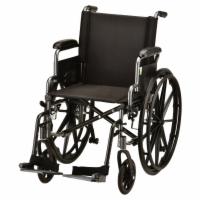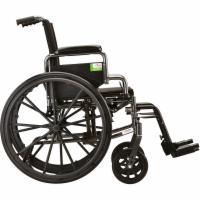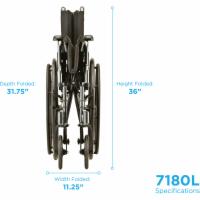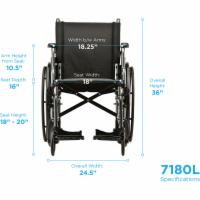WHEELCHAIR LIGHTWEIGHT 18" SEAT DESK ARMS SWING AWAY FOOTRESTS
| Your Price | $414.95 |
|---|---|
| Regular Price | $459.95 |
| *Non-Contiguous U.S. States & Territories - please call for shipping charges. | |

- LIGHTWEIGHT, COMFORTABLE, VERSATILE, DURABLE & SAFE wheelchair with great features to optimize safety, comfort, fit and mobility. Comes with Anti-Tippers to prevent tipping when on an incline or tilted back to get up on a curb. The upholstery is made super strong and durable nylon canvas material that is comfortable, breathable and easy to clean. A foam polyurethane insert provides comfortable padding for the seat and back upholstery. The frame has sleek and scratch resistant hammer-tone grey/black finish. Foldable and weighs only 32 lbs. (without footrests)
- EASY USER TRANSFER - Flip up arms make transferring the user from a car, bed or chair much easier. Simply push a lever to release the arm, then push back down to lock the arms in place. The “desk” style arms allow the user and wheelchair chair to “ride up” to a desk or dining table. The arms are padded for comfort and the vinyl material is durable and easy to clean
- EASY TO USE FOOTRESTS - Footrests are easy to remove and lock back into place. They are easy to adjust and come with heel loops so the user can rest their feet. Footplate Height from Floor: 5" - 9"
- CUSTOMIZE WITH EXTENDABLE UPHOLSTERY (to accommodate a seat cushion) & HEMI (shorter) SEAT OPTION. The back handles and upholstery can be raised 2" to accommodate a seat cushion. The wheelchair seat can also be lowered 2" with the dual axle positions on the wheels
- SIZES, SPECIFICATIONS & VIDEO: Comes in 3 seat widths: 16”, 18” and 20” - all with a seat depth of 16”. Weight capacity is 300 lbs. Product weight is 32 lbs. (without footrests). See images for all specifications and video for more information
| Product Weight - Min | 31.6 lbs |
| Seat Width - Max | 18" |
| Seat Depth - Max | 16" |
| Ergonomic Seat | No |
| Caster Size Range | 8" |
| Rear Wheel Size Range | 24" |
| Adjustable Back Angle | No |
| Shipping Info | |
|---|---|
| Shipping Weight | |
| Shipping Length | |
| Shipping Width | |
| Shipping Height | |

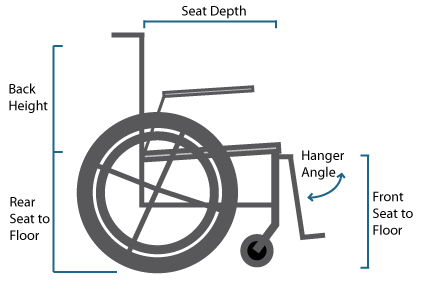
Seat Width: Measure the widest point of your body between the knees and hips. Add at least one inch- to this measurement for some extra breathing room. If you typically wear bulky or heavy clothing, such as during outdoor use in winter, you may wish to add two inches to this measurement to give yourself adequate room to move.
Back Height: This measurement will determine the distance from the seat base to the top of the wheelchair's seat back. Typically, you'll want to measure from the most posterior point of your body to the center point between your shoulder blades. Some users may prefer a higher back for added support, but remember that the higher the back of the chair is, the less room you'll have to rotate your upper body while seated.
Front Seat to Floor: Measure your leg from the back of your knee to the sole of your foot. Unless you are choosing a foot-propelled wheelchair, you will want to add two inches to this measurement to give yourself plenty of clearance for a footrest.
Camber: This is the term for the angle of the wheels in relation to the vertical plane of the wheelchair. A typical wheelchair has a 3-degree positive camber; sports models tend to have greater positive camber to allow for more user agility during athletic activity. If you are unsure how much camber you require, please call out wheelchair specialists at 1 (800) 251-7250 for assistance before you place your order.
Seat Depth: Measure from the most posterior point of your body to the interior of your knee, deducting two inches from the total. You may require a greater amount of leg overhang to lift your legs during use; if so, consult your rehabilitation professional for guidance on adjusting your measurements accordingly, or speak with one of our manual wheelchair specialists by dialing 1 (800) 251-7250 to get the right fit.
Rear Seat to Floor: This is the distance from the ground to the rear edge of the wheelchair's seat. Comparing this measurement to the front-seat-to-floor measurement will give you an idea of the wheelchair's rearward slope - sometimes referred to as the "dump" or "squeeze". Your individual physical needs and capabilities will affect how steep you wish the rearward slope of the chair to be.
Hanger Angle: This measurement specifies how far your toes will extend from your body when seated, and is measured horizontally. The tighter your hanger angle, the less space you'll need to turn your wheelchair around. The flexibility of your legs and knees may also impact the hanger angle you will want to choose. Most wheelchairs have a hanger angle of about 70 degrees, and the farthest hanger angle available on any wheelchair is 60 degrees. Pediatric chairs have a hanger angle of 90 degrees to accommodate the shorter leg length of child users. A hanger angle is difficult for a wheelchair user to measure on their own, so we highly recommend calling one of our manual wheelchair experts at 1 (800) 251-7250 to help you find a chair with the optimal hanger angle for your needs.


